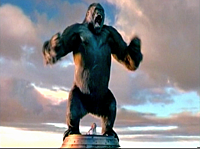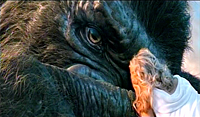The Passion of the Kong
How to Turn a Classic into a Masterpiece
An Appreciation by Barry M. Lamont
Martyrdom
For me, the most powerful moment is not Kong's death, but the scene a few minutes earlier when an obviously dying Kong lifts himself up with great effort, pounds his chest, and roars out for the third and final time. Visually, there is an almost identical scene in 1933, but Peter Jackson has structured his film to give this climactic scene a completely different emotion. Kong's vocalizations throughout the film have been much more nuanced than in 1933; here, for the first time, his powerful roar is dominated by a note of anguish, and Ann's cry echoes his. The music is also key: Max Steiner's 1933 music for Kong is powerful, ominous, tense; James Newton Howard's score is elegiac. Beyond these details, however, it is the fact that Jackson sees Kong as a tragic character, rather than an unpredictable force of nature; and that he has shown us that character, instead of leaving Kong (as in 1933) an enigma; that makes the scene so poignant.
Religious fundamentalists (of all faiths) insist that every word in their sacred books is true - which is philosophically supportable - but then go on to insist that every word must be interpreted in the most simplistic, literal fashion, which cannot be true because of factual contradictions and internal inconsistencies in those texts. Matthew and Mark describe Christ's final moments with these words [Matthew 27:46]: "And about the ninth hour Jesus cried with a loud voice, saying . . . Father, why have you forsaken me?" (King James' actual rendering is "My God, why hast thou forsaken me?", which sounds a bit formal under the circumstances; my reading is theologically correct, and more urgent.) Luke, however, reports that "when Jesus had cried with a loud voice, he said, Father, into thy hands I commend my spirit" [Luke 23:46] - please, take me from this world; I can't bear it here any longer. While I doubt that Peter Jackson intended anything this literal, it is interesting to note that you can superimpose either set of Last Words on that final howl of anguish, and it works.
The end, when it finally comes - after the hammering in of a few more gratuitous nails - is almost silent. (The Last Words according to John: "It is finished.") As Jackson comments, "you can see the moment when the light goes out of his eyes"; and it is a tribute to his complete commitment to the story that an effect this subtle was as important to him as all the spectacular chases and battles which came before it.
Religious fundamentalists (of all faiths) insist that every word in their sacred books is true - which is philosophically supportable - but then go on to insist that every word must be interpreted in the most simplistic, literal fashion, which cannot be true because of factual contradictions and internal inconsistencies in those texts. Matthew and Mark describe Christ's final moments with these words [Matthew 27:46]: "And about the ninth hour Jesus cried with a loud voice, saying . . . Father, why have you forsaken me?" (King James' actual rendering is "My God, why hast thou forsaken me?", which sounds a bit formal under the circumstances; my reading is theologically correct, and more urgent.) Luke, however, reports that "when Jesus had cried with a loud voice, he said, Father, into thy hands I commend my spirit" [Luke 23:46] - please, take me from this world; I can't bear it here any longer. While I doubt that Peter Jackson intended anything this literal, it is interesting to note that you can superimpose either set of Last Words on that final howl of anguish, and it works.
The end, when it finally comes - after the hammering in of a few more gratuitous nails - is almost silent. (The Last Words according to John: "It is finished.") As Jackson comments, "you can see the moment when the light goes out of his eyes"; and it is a tribute to his complete commitment to the story that an effect this subtle was as important to him as all the spectacular chases and battles which came before it.

